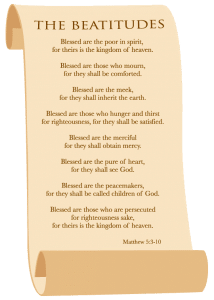 Have you ever felt bad for doing something wrong, and had someone tell you that you have Catholic Guilt? What is Catholic Guilt? Why is it labeled Catholic?
Have you ever felt bad for doing something wrong, and had someone tell you that you have Catholic Guilt? What is Catholic Guilt? Why is it labeled Catholic?
The phrase Catholic Guilt was coined in reference to the understanding that Catholics are held to follow lots of rules. Consequently, when a person breaks those rules they commit “sin” which separates us from God. This “sin” is strongly emphasized in regards to morality in the Catholic Church, which seems to be emphasized more than all the good we do.
As all of this is true in the Catholic faith there are a lot of holes that need to be filled in order to get the complete context of Catholic Guilt. I think that if properly understood, people will find that “Catholic Guilt” is actually a necessity not only in faith life, but in our everyday actions as well.
The root of Catholic Guilt is linked to moral development, or how we train ourselves to make either good or bad decisions. As we grew up our parents taught us the difference between right and wrong, and through our faith we have guiding principles like the 10 Commandments and the Beatitudes which help us to make right decisions as well. But, God also gave us the gift of free will and conscience. Guilt is a feeling that flows from our conscience. Guilt is that feeling of heaviness in the pit of our stomachs that lets us know there is something wrong.
I think the tendency is to view guilt as a negative feeling. Rather, guilt should be seen as a gift. If our conscience is properly formed, meaning that as we grew up we have trained our conscience to know the difference from right and wrong, then our conscience will inherently know when we have committed a wrong action. Nobody is perfect, so no matter how well you form your conscience you will still make mistakes. So, being in touch with your conscience and understanding why you are feeling guilty for a decision becomes important.
The beauty of the Catholic Church is that when we experience that feeling of guilt we can bring God into the equation. The sacrament of Reconciliation allows us to come in front of God and ask for forgiveness for anything we are feeling guilty about. Consequently, the beauty of the sacrament is that we can be forgiven no matter what we have done. The sacrament of Reconciliation offers both healing and peace from God. “Have no anxiety at all, but in everything, by prayer and petition, with thanksgiving, make your requests known to God. Then the peace of God that surpasses all understanding will guard your hearts and minds in Christ Jesus.” (Philippians 4:6-7)
So, in essence the stereotype of Catholic Guilt needs to be understood in the context of our conscience in moral development, and understanding why we are feeling guilty in the first place. So, my challenge for you, the next time you feel that guilt figure out why it’s there, thank God for that guilt, and consider receiving God’s healing forgiveness in the sacrament of Reconciliation.
Sources
Catholic Faith Handbook by St. Mary’s Press. Chapter 23: Introduction to Christian Morality.
(Philippians 4:6-7)
Have no anxiety at all, but in everything, by prayer and petition, with thanksgiving, make your requests known to God. Then the peace of God that surpasses all understanding will guard your hearts and minds in Christ Jesus.
